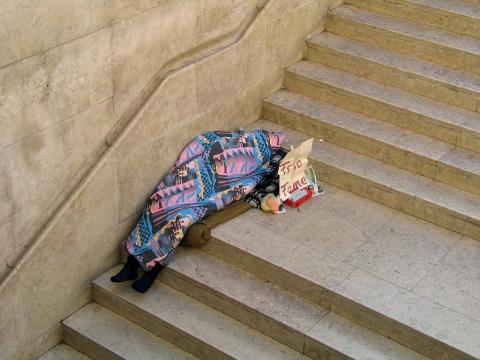Austerity’s impact on rough sleeping and violence

Image source: Osvaldo Gago/Flickr, CC BY-SA 2.0
‘Rough sleeping’ or ‘street homelessness’ is often regarding as the most visible manifestation of poverty. Since the onset of austerity in 2010, the number of people estimated to be sleeping rough in England has increased year-on-year, with the number of people estimated to be sleeping rough in 2016 more than double the 2010 figure. There is strong evidence linking this increase to welfare reform, a cornerstone of the UK Government’s austerity measures.
People who sleep rough are up to 13 times more likely than the general population to experience violence. This violence takes physical, sexual, and verbal forms – with a recent Crisis report showing continuing high prevalence of violence in the lives of people sleeping rough. However, this isn’t the only way in which violence is felt by people sleeping rough, as these individuals also feel the full force of the state’s structural violence, in the form of suffering poorer health outcomes than the housed population, as well as suffering emotional and psychological trauma through statutory requirements to negotiate demeaning and excessively bureaucratic processes in order to gain access to basic services.
People who sleep rough use numerous strategies to deal with the violence they face, such as carrying a weapon for self-protection or sleeping in industrial bins to shelter – but both of these can lead to other, sometimes fatal, outcomes. One strategy often employed by those sleeping rough is to make use of local homelessness services. These services don’t always offer the perfect answer to the difficulties faced whilst homeless, but can provide basic amenities such as food, drink, washing facilities and social support. As such, they can be a vital, if sometimes imperfect, resource for homeless people.
However, austerity is exacerbating the violence faced by people sleeping rough, with wide-ranging impacts. These impacts are felt in various ways by people who are sleeping rough, with these individuals facing increased difficulties in moving out of homelessness, and some turning to harmful behaviours such as alcohol and drug use to deal with the effects of measures such as welfare reform. Cuts to services within and outside of the homelessness sector have exacerbated the difficulties faced by rough sleepers, with many vital support services finding it increasingly difficult to support individuals. Many of these services have seen reduced government funding and are increasingly stretched, facing little option but to ration their provision. Consequently, some individuals whose needs are too acute to be met by general services, but not severe enough to be met specialist services, are falling between the cracks in provision.
Recent proclamations by the UK Government of ‘investment’ in homelessness services do little to stem to impact of these cuts, instead masking the impact such cuts have had. In 2016, the Conservative Government announced a £115 million ‘investment’ into homelessness services, committing to delivering 2000 more bed spaces. However, this figure is less than half of the bed spaces lost in such services since 2010. The Government has also administered funding for specific types of provision, whilst reducing general levels of funding for homelessness services. Such a move allows the Government to exert greater control over which types of services receive funding. Thus, services faced increased pressure to conform to Government expectations in order to receive state funding, making it increasingly difficult for service providers to be critical of Government policy.
Thus, the Government’s austerity measures simultaneously serve to punish those sleeping rough, whilst allowing the Government to exert increasing control over the homelessness sector. Meanwhile, those on the streets feel the full force of this austerity programme, with the violence of austerity felt in the increased number of people subject to violence whilst sleeping rough; the violent impact of austerity measures such as welfare reform; and the removal of core funding streams from services who support those sleeping rough.
Daniel McCulloch is a contributing author in ‘The Violence of Austerity’ where he writes on ‘Austerity’s impact on rough sleeping and violence’. The book is available to buy from Pluto Press:
https://www.plutobooks.com/9780745399485/the-violence-of-austerity/
Daniel McCulloch, The Open University
